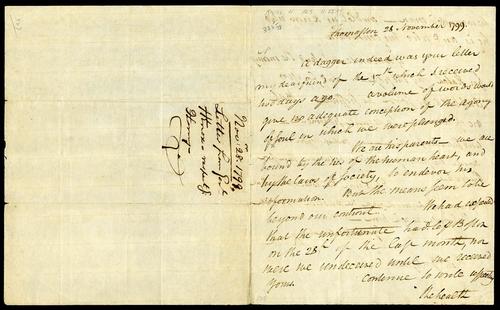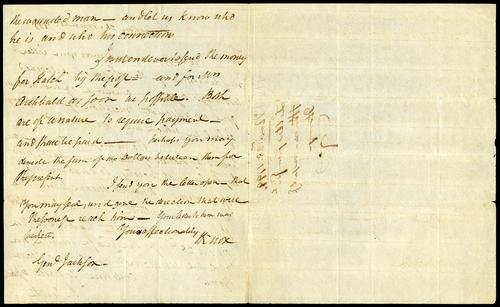Auction: 329 - The Numismatic Collector's Series Sale
Lot: 942
Knox, Henry. (July 25, 1750 - October 25, 1806). ALS. 8vo. 3pp. November 28, 1799, about two weeks before George Washington's death. Thomaston, Maine. To "Genl Jackson" (Henry Jackson, a lifelong close friend who acted as his agent in his business affairs while the General was Secretary of War. Henry Knox was our first United States Secretary of War (1789-1794). He began his military career as an officer of the Continental Army, and became the chief artillery officer, accompanying George Washington on many campaigns, and establishing training centers and manufacturing facilities that were of great importance to the success of the Revolution. After the Revolutionary War, he served in the United States Army. Later, as Secretary of War, he was responsible for establishing policies that dealt with the way the Federal Government treated to Native Americans. The letter asks his closest friend, Henry Jackson, to help Knox deal with problems he is having with his son:
"A dagger indeed was in your letter my dear friend of the 7th I received two days ago. A volume of words would give no adequate conception of the agony of soul in which we were plunged. We are his parents - we are bound by the ties of the human heart, and by the laws of society, to endeavor his reformation. But the means seem to be beyond our control. " Knox states that he is sending money to be paid to the apparent victims of his son's latest activities.
Knox had thirteen children, but only one son, Henry Jackson Knox, lived to adulthood. The son was well known for his drinking and scandalous behavior, and it is clear from the letter that his father was constantly called upon to bail him out of trouble. The son, repentant, and "impressed with a deep sense of his own unworthiness, later requested that his remains should not be interred with his honored relatives but placed in a common burial ground "with no stone to tell where."
Very good condition, with an unobtrusive split in the fold between pages. Pencil notations indicate that the letter was purchased for $325 in 1978. Enclosed in a Rendell folder.
Sold for
$375







